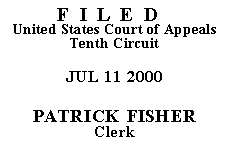

|
JOE R. McBRIDE, |
|
Before BRORBY, KELLY, and MURPHY, Circuit Judges.
Joe R. McBride, proceeding pro se, seeks a certificate of appealability ("COA") so he can appeal the district court's denial of his 28 U.S.C. § 2254 habeas petition. See 28 U.S.C. § 2253(c)(1)(A) (providing that an appeal may not be taken from the denial of a § 2254 habeas petition unless the petitioner first obtains a COA). Additionally, although the district court denied McBride's motion to proceed in forma pauperis on appeal, McBride has renewed that request by filing a motion to proceed in forma pauperis with this court. McBride's motion to proceed in forma pauperis is granted.
In 1993, McBride was convicted of escaping from a penitentiary and sentenced to a two-year term of incarceration by the Oklahoma County District Court. McBride completed his sentence on or about June 19, 1995 and was released from incarceration. In 1997, McBride was arrested on unrelated charges, pleaded guilty, and was sentenced to ten years' imprisonment. McBride is currently incarcerated on the 1997 charges.
McBride filed the instant § 2254 habeas petition with the United States District Court for the Western District of Oklahoma on February 2, 2000. In the petition, McBride raised several challenges to the constitutionality of his 1993 conviction and sentence. He then claimed that the 1993 "unconstitutional conviction" was used to enhance the sentence he received for the offenses to which he pleaded guilty in 1997.
McBride's habeas petition was referred to a United States magistrate judge. The magistrate prepared a Report and Recommendation ("R & R") recommending that McBride's habeas petition be dismissed. The R & R concluded that McBride could not satisfy the "in custody" requirement of 28 U.S.C. § 2254 and, therefore, the court did not have jurisdiction over his petition. McBride filed a timely objection to the R & R which the district court considered. The district court, however, adopted the R & R and dismissed McBride's habeas petition. McBride appealed.
This court does not have jurisdiction over a § 2254 habeas petition unless the petitioner is "in custody" under the conviction he attacks. See 28 U.S.C. § 2254(b); Maleng v. Cook, 590 U.S. 488, 491-92 (1989) (per curiam). McBride's incarceration under the conviction that is the subject of the instant habeas petition ended on June 19, 1995. Although McBride claims the 1993 conviction has been used to enhance the sentence he is currently serving on unrelated charges, it is well-settled that collateral consequences are not sufficient to satisfy the "in custody" requirement of § 2254. See Maleng, 590 U.S. at 492 ("The question presented by this case is whether a habeas petitioner remains 'in custody' under a conviction after the sentence imposed for it has fully expired, merely because of the possibility that the prior conviction will be used to enhance the sentences imposed for any subsequent crimes of which he is convicted. We hold that he does not."). This court has held that "even when a fully-expired conviction has, in fact, been used to enhance a subsequent sentence, it may not be attacked directly in a habeas action." Gamble v. Parsons, 898 F.2d 117, 118 (10th Cir. 1990). If a petitioner is currently serving a sentence that has been enhanced by the expired sentence, however, the expired sentence can be attacked in a habeas petition challenging the petitioner's current term of incarceration. See id.
The magistrate judge noted that McBride has filed a separate habeas petition challenging the 1997 convictions and that this petition is currently pending in the United States District Court for the Western District of Oklahoma. In light of the fact that McBride's term of incarceration on the conviction he attacks in this habeas petition has fully expired, this court lacks jurisdiction over his appeal. McBride must raise any claims relating to the constitutionality of his 1993 conviction in the habeas petition he has filed wherein he challenges the constitutionality of his current term of incarceration.
McBride is not entitled to receive a COA unless he can make "a substantial showing of the denial of a constitutional federal right." 28 U.S.C. § 2253(c)(2). McBride can make such a showing by demonstrating the issues raised are debatable among jurists, a court could resolve the issues differently, or that the questions presented deserve further proceedings. See Slack v. McDaniel, 120 S. Ct. 1595, 1603-04 (2000).
Upon review of McBride's application for a COA and appellate brief and de novo review of the R & R, the district court's order, and the entire record on appeal, this court concludes the issues raised by McBride are not reasonably debatable, subject to a different resolution on appeal, or deserving of further proceedings. Consequently, McBride has not made a substantial showing of the denial of a federal right as required by 28 U.S.C. § 2253(c)(2) and he is not entitled to a COA. Accordingly, we deny McBride's application for a COA for substantially those reasons set out in the R & R dated February 23, 2000, and dismiss his appeal.
ENTERED FOR THE COURT
Michael R. Murphy
Circuit Judge
*. This order and judgment is not binding precedent, except under the doctrines of law of the case, res judicata and collateral estoppel. The court generally disfavors the citation of orders and judgments; nevertheless, an order and judgment may be cited under the terms and conditions of 10th Cir. R. 36.3.